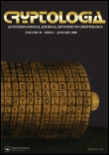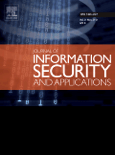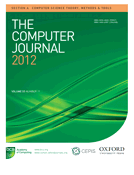
Cryptography
Scope & Guideline
Pioneering Research in Data Protection
Introduction
Aims and Scopes
- Cryptographic Protocol Design:
The journal emphasizes the design and analysis of cryptographic protocols, including secure communication, authentication, and key exchange mechanisms. - Post-Quantum Cryptography:
With the advent of quantum computing, the journal has a strong focus on post-quantum cryptographic schemes that are resilient to quantum attacks, ensuring future-proof security. - Lightweight Cryptography:
Research on lightweight cryptographic systems suitable for resource-constrained environments, such as IoT devices, is a core area, addressing the need for efficiency without compromising security. - Privacy-Preserving Techniques:
The journal explores various methods for preserving privacy in data sharing and analysis, particularly in cloud computing and IoT applications. - Side-Channel Attack Mitigation:
There is a significant focus on techniques to protect against side-channel attacks, which exploit physical implementations of cryptographic algorithms. - Blockchain and Distributed Ledger Technology:
The journal investigates the intersection of cryptography with blockchain technology, exploring secure applications including electronic voting and data sharing. - Biometric Cryptography:
Research on biometric-based cryptographic systems for secure authentication and key exchange is a notable area, reflecting the growing importance of biometrics in security protocols.
Trending and Emerging
- Homomorphic Encryption:
The increasing interest in homomorphic encryption reflects a growing need for privacy-preserving computation, enabling operations on encrypted data without decryption. - Neural Network Applications in Cryptography:
The application of machine learning and neural networks to cryptographic problems is gaining traction, showcasing a blend of AI and cryptographic techniques for enhanced security. - Secure Multi-Party Computation (MPC):
Research on secure multi-party computation is trending, focusing on enabling parties to jointly compute a function while keeping their inputs private, which is crucial in collaborative environments. - Blockchain Security Enhancements:
As blockchain technology matures, innovative security solutions and protocols specifically designed for blockchain applications are emerging, addressing vulnerabilities and enhancing trust. - Privacy in IoT and Cloud Environments:
With the rise of IoT devices and cloud services, there is a growing emphasis on developing privacy-preserving techniques tailored to these environments, ensuring user data security. - Quantum Key Distribution (QKD):
Research into quantum key distribution is expanding, driven by the need for secure communication methods that leverage quantum mechanics to provide unbreakable security.
Declining or Waning
- Traditional Public-Key Cryptography:
There has been a noticeable decrease in research centered around conventional public-key cryptography schemes as the field shifts towards more advanced and quantum-resistant models. - Classical Cryptanalysis Techniques:
The exploration of classical cryptanalysis methods has diminished, likely due to the increasing complexity of modern cryptographic algorithms and the emergence of new analytical techniques. - Basic Cryptographic Algorithms:
Research focused on well-established algorithms like RSA and AES without novel contributions or enhancements has become less prominent, as the community seeks more innovative approaches. - Simple Random Number Generators:
Studies on basic random number generation methods are less frequent, possibly overshadowed by more advanced techniques and the need for robust randomness in cryptographic applications.
Similar Journals

International Journal of Networked and Distributed Computing
Connecting Ideas, Transforming TechnologiesWelcome to the International Journal of Networked and Distributed Computing, published by SpringerNature, a premier outlet for cutting-edge research in the realms of computer networks and distributed computing systems. Established as an Open Access journal since 2013 and based in the Netherlands, this publication strives to disseminate high-quality, peer-reviewed studies that address the complexities of contemporary computing challenges. With an impact factor that reflects its growing influence—positioned in the Q3 category for both Computer Networks and Communications and Computer Science Applications—this journal serves as a pivotal resource for scholars and practitioners aiming to advance knowledge and innovation in this rapidly evolving field. The journal encompasses diverse topics, from network protocols to distributed algorithms, ensuring that researchers, professionals, and students can find relevant insights and methodologies to inform their work. Join us in exploring the depths of networked and distributed computing, contributing to a collaborative academic environment that shapes the future of technology.

Cryptography and Communications-Discrete-Structures Boolean Functions and Sequences
Elevating the discourse in applied mathematics and cryptographic research.Cryptography and Communications - Discrete Structures, Boolean Functions and Sequences is a distinguished journal published by Springer, focusing on the crucial intersections of cryptography, discrete mathematics, and communication systems. With a significant presence in the academic community since its inception in 2009, the journal has established a robust reputation, holding a Q1 ranking in Applied Mathematics and notable positions in other relevant categories, reflecting its impact in the field. Researchers and professionals will find this journal engaging as it rigorously explores the theoretical underpinnings and practical applications of boolean functions and sequences, essential for advancing secure communication protocols and efficient data processing. Despite not currently offering open access, the journal is highly regarded for its quality peer-reviewed articles, making it a vital resource for scholars aiming to contribute to or stay at the forefront of cryptographic research. Its continual publication through 2024 ensures an ongoing dialogue in this rapidly evolving field, enhancing understanding and innovation among its readership in the United States and beyond.

Quantum Information Processing
Exploring the future of quantum technologies.Quantum Information Processing, published by Springer, stands as a pivotal journal within the rapidly evolving field of quantum computing and information science. With an ISSN of 1570-0755 and an E-ISSN of 1573-1332, this journal has been a vital resource since its inception in 2004 and is set to continue contributing until 2024. Ranked in Q2 for Electrical and Electronic Engineering, Electronic, Optical and Magnetic Materials, and various other categories, its high visibility in academic circles is reinforced by its Scopus rankings, showcasing its integral role in advancing theoretical and practical aspects of quantum technologies. Although it operates under a subscription model, Quantum Information Processing prioritizes accessibility to groundbreaking research that covers a wide spectrum of topics, including quantum algorithms, quantum cryptography, and quantum error correction, making it essential reading for researchers, professionals, and students alike. As the field grows, the journal remains committed to fostering innovation and collaboration among scholars, ensuring its position as an influential platform for sharing pivotal advancements in quantum information theory and applications.

Journal of Computer Security
Driving the evolution of safety and reliability in technology.Welcome to the Journal of Computer Security, a premier publication dedicated to advancing the field of cybersecurity and digital safety. Published by IOS PRESS, this esteemed journal has been at the forefront of research since its inception, with a rich history spanning from 1992 to 2024. Based in the Netherlands, the journal aims to provide a reputable platform for researchers and professionals to disseminate innovative findings in various subfields, including computer networks, hardware architecture, and software engineering. With its current Q3 ranking across multiple categories and a focus on safety, risk, reliability, and quality, the journal plays a critical role in shaping contemporary discourse and fostering collaboration within the cybersecurity community. Though it is not an open-access journal, the Journal of Computer Security remains a vital resource for academics and practitioners alike, offering access to significant advancements and methodologies that guide the evolution of security practices worldwide. Engage with us and contribute to this dynamic field of study!

Journal of Cryptographic Engineering
Exploring the depths of cryptography for a safer digital world.The Journal of Cryptographic Engineering, published by Springer Heidelberg, is a prominent platform dedicated to advancing the field of cryptography and its applications in secure communication and information security technologies. With the ISSN 2190-8508 and E-ISSN 2190-8516, this journal showcases rigorous and innovative research contributions from 2011 to 2024, reflecting its commitment to excellence in academic publishing. Recognized among the Q2 category in Computer Networks and Communications and Software, it ranks impressively within the Scopus framework, securing positions in the 59th and 54th percentiles respectively. The Journal aims to facilitate a comprehensive understanding of cryptographic techniques, promote collaboration among researchers, and provide a vital resource for students and professionals. By maintaining high standards of peer review and providing a platform for cutting-edge research, it plays a crucial role in shaping the future of cryptographic engineering.

CRYPTOLOGIA
Bridging Theory and Application in Cryptographic ResearchCRYPTOLOGIA, published by Taylor & Francis Inc, is a pivotal journal dedicated to the field of cryptography and its applications. With an ISSN of 0161-1194 and an E-ISSN of 1558-1586, this journal has been a significant platform since its inception in 1977, promoting rigorous peer-reviewed research for scholars and practitioners alike. Although the journal's coverage was discontinued in Scopus after 2018, its legacy continues through a devoted readership, and it remains influential in the domains of Computer Science and Applied Mathematics, as indicating by its Scopus rankings. CRYPTOLOGIA presents a crucial repository of knowledge for those engaged in the evolving challenges of secure communication and information integrity. Researchers, professionals, and students interested in cryptographic protocols and theory can find invaluable insights and advancements within its pages, all while benefiting from the quality assurance of a reputable publisher.

International Journal of Computer Mathematics- Computer Systems Theory
Pioneering Insights in Computer Mathematics and TheoryInternational Journal of Computer Mathematics - Computer Systems Theory, published by Taylor & Francis Ltd, is a vital resource in the fields of computational mathematics and computer systems theory. With an ISSN of 2379-9927 and E-ISSN 2379-9935, this journal has established a prominent presence in academia since its inception in 2016. It is categorized in the Q3 quartile for both Computational Mathematics and Computational Theory in 2023, reflecting its impact and contribution to the scholarly discourse within these domains. The journal’s Scopus rankings further emphasize its academic relevance, placing it in the 38th and 33rd percentiles in their respective categories. International Journal of Computer Mathematics aims to disseminate innovative research findings, methodologies, and theoretical advancements, making it an essential publication for researchers, professionals, and students looking to deepen their understanding of computational methods and applications. Although it currently does not offer open access, the journal continues to provide insightful contributions to the scientific community, fostering the evolution of computational sciences.

Cybersecurity
Advancing Cyber Resilience Through Innovative ResearchCybersecurity, published by SpringerNature, serves as a pivotal platform in the realms of Artificial Intelligence, Information Systems, Software, and Computer Networks and Communications. With an impressive Impact Factor and an Open Access model initiated in 2018, this journal facilitates widespread dissemination of innovative research findings to a global audience. Based in the United Kingdom, Cybersecurity aims to advance knowledge and application in security innovations, risk management, and system resilience against cyber threats. The journal's current standing is prominently reflected in its Q1 and Q2 ratings across various computer science categories, indicating its reputable contribution to the academic community. By continuously publishing cutting-edge research, Cybersecurity plays a crucial role in informing policy decisions, advancing technology, and enhancing the collective understanding of cyber resilience, making it an essential resource for researchers, professionals, and students alike.

Journal of Information Security and Applications
Navigating Challenges in the Realm of SecurityJournal of Information Security and Applications, published by ELSEVIER, is a premier outlet for cutting-edge research in the field of information security and applications. With a dedicated ISSN of 2214-2126 and an E-ISSN of 2214-2134, this journal ranks impressively in the top quartile (Q1) across multiple categories as of 2023, including Computer Networks and Communications, Safety, Risk, Reliability and Quality, and Software. The journal’s notable Scopus rankings further reflect its impact, holding positions within the top 15% in several engineering and computer science areas. Spanning a converged period from 2013 to 2024, the journal aims to disseminate high-quality research findings, facilitating a vibrant platform for scholars, practitioners, and students to engage with contemporary challenges in information security. Although not an open-access journal, the knowledge shared within its pages is indispensable for those dedicated to advancing the technological and theoretical underpinnings of security measures in various applications.

COMPUTER JOURNAL
Shaping the Future of Technology Through Scholarly ExcellenceCOMPUTER JOURNAL, published by Oxford University Press, is a distinguished platform for innovative research in the field of computer science, with a focus on general and miscellaneous aspects. The journal, established in 1967, continues to advance the boundaries of knowledge in computational technologies, algorithms, and interdisciplinary applications, contributing to its impressive ranking of Q2 in the 2023 Scopus category for Computer Science. With a robust ISSN of 0010-4620 and E-ISSN 1460-2067, it serves as a vital resource for researchers, professionals, and students seeking to stay at the forefront of technological advancements. Though not an open-access journal, it provides numerous access options via institutional subscriptions, making its high-impact articles widely available, especially as the journal bridges over five decades of research from 1967 to 2024. The COMPUTER JOURNAL is committed to fostering scholarly communication and ensuring that critical insights in the ever-evolving realm of computer science reach a diverse audience, thus solidifying its role as an essential resource in academia.